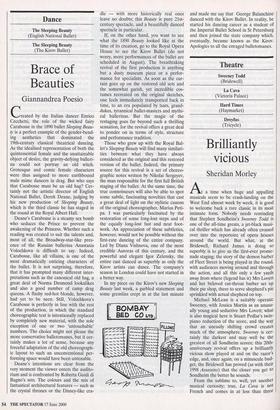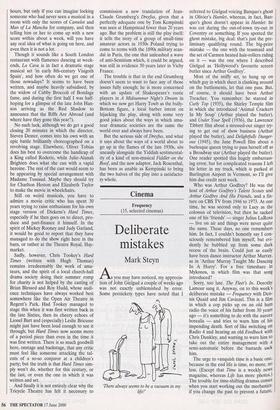Theatre
Sweeney Todd (Bridewell) La Cava (Victoria Palace) Hard Times (Haymarket) Dreyfus (Tricycle)
Brilliantly vicious
Sheridan Morley
Aa time when huge and appalling musicals seem to be crash-landing on the West End almost week by week, it is good to welcome back a rare classic in its most intimate form. Nobody needs reminding that Stephen Sondheim's Sweeney Todd is one of the all-time greats, a jet-black musi- cal thriller which has already often crossed over into the repertoire of opera houses around the world. But what, at the Bridewell, Richard James is doing so superbly is to give us the first-ever prome- nade staging; the story of the demon barber of Fleet Street is being played in the round, with audiences moving around and through the action, and all this only a few yards away from where (legend has it) Mrs Lovett and her beloved cut-throat barber set up their pie shop, there to serve shepherd's pie sprinkled with actual shepherd on top.
Michael McLean is a suitably operatic Sweeney, with Jessica Martin as an unusu- ally young and seductive Mrs Lovett; what is also magical here is Stuart Pedlar's twin- piano reduction of the score, and the way that an uneasily shifting crowd creates much of the atmosphere. Sweeney is cer- tainly the darkest and may well be the greatest of all Sondheim scores; this 20th- anniversary revival offers up a brilliantly vicious show played at and on the razor's edge, and, once again, on a minuscule bud- get, the Bridewell has proved (as with their 1998 Assassins) that the closer you get to Sondheim the better he sounds.
From the sublime to, well, yet another musical curiosity; true, La Cava is not French and comes in at less than three hours, but only if you can imagine locking someone who had never seen a musical in a room with only the scores of Camelot and Man of La Mancha for company, and then telling him or her to come up with a new score within about a week, will you have any real idea of what is going on here, and even then it is not a lot.
Though it sounds like a South London restaurant with flamenco dancing at week- ends, La Cava is in fact a dramatic stage musical set 'in early 8th-century Visigoth Spain', and how often do we get one of those nowadays? It seems to have been written, and maybe heavily subsidised, by the widow of Cubby Broccoli of Bondage fame, and during the first half I was half- hoping for a glimpse of the late John Han- son arriving as the Red Shadow to announce that the Riffs Are Abroad (and where have they gone this year?).
No such luck, although we do get a good closing 20 minutes in which the director, Steven Dexter, comes into his own with an epic battle brilliantly choreographed on a revolving stage. Elsewhere, Oliver Tobias does his best to overcome the handicap of a King called Roderic, while Julie-Alanah Brighten does what she can with a vapid heroine. The rest of the cast would seem to be appearing by special arrangement with Madame Tussaud. Maybe they should try for Charlton Heston and Elizabeth Taylor to make the movie in wheelchairs.
Still on weird musicals, you have to admire a movie critic who has spent 30 years trying to raise enthusiasm for his own stage version of Dickens's Hard Times, especially if he then goes on to direct, pro- duce and part-finance it himself. In the spirit of Mickey Rooney and Judy Garland, it would be good to report that they have managed to do the show right here in the barn, or rather at the Theatre Royal, Hay- market.
Sadly, however, Chris Tookey's Hard Times (written with Hugh Thomas) remains irredeemably the work of ama- teurs, and the spirit of a local church-hall drama society doing their summer romp for charity is not helped by the casting of Brian Blessed and Roy Hudd, whose audi- ence techniques have always worked best somewhere like the Open Air Theatre in Regent's Park. Had Tookey managed to stage this when it was first written back in the late Sixties, then its cheery echoes of Lionel Bart and (especially) Leslie Bricusse might just have been loud enough to see it through; but Hard Times now seems more of a period piece than even in the time it was first written. There is so much goodwill here, onstage and backstage, that any critic must feel like someone attacking the tal- ents of a so-so conjuror at a children's party; but the truth is that Hard Times sim- ply won't do, whether for this century, or the last, or even the one in which it was written and set.
And finally it is not entirely clear why the Tricycle Theatre has felt it necessary to commission a new translation of Jean- Claude Grumberg's Dreyfus, given that a perfectly adequate one by Tom Kempinski was seen at Hampstead fewer than 20 years ago. But the problem is still the play itself: it tells the story of a group of small-time amateur actors in 1930s Poland trying to come to terms with the 1890s military scan- dal in Paris, the one that unleashed a wave of anti-Semitism which, it could be argued, was still in evidence 50 years later in Vichy France.
The trouble is that in the end Grumberg doesn't seem to want to face any of those issues fully enough; he is more concerned with an update of Shakespeare's rustic players in A Midsummer Night's Dream in which we now get Harry Towb as the bully- Bottom figure, a local barber intent on hijacking the play, along with some very good jokes about the ways in which ama- teur dramatic societies are the same the world over and always have been.
But the serious side of Dreyfus, and what it says about the ways of a world about to go up in the flames of the late 1930s, sits uneasily alongside the Yiddish sentimental- ity of a kind of non-musical Fiddler on the Roof, and the new adaptor, Jack Rosenthal, has been as unable as Kempinski to bring the two halves of the play into a satisfacto- ry whole.











































































 Previous page
Previous page